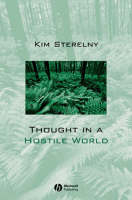
Thought in a Hostile World
Wiley-Blackwell (Verlag)
978-0-631-18887-2 (ISBN)
WINNER OF THE 2004 LAKATOS AWARD!
Thought in a Hostile World is an exploration of the evolution of cognition, especially human cognition, by one of today's foremost philosophers of biology and of mind.
Featuresan exploration of the evolution of human cognition.
Written by one of today’s foremost philosophers of mind and language.
Presents a set of analytic tools for thinking about cognition and its evolution.
Offers a critique of nativist, modular versions of evolutionary psychology, rejecting the example of language as a model for thinking about human cognitive capacities.
Applies to the areas of cognitive science, philosophy of mind, and evolutionary psychology.
Kim Sterelny is Professor of Philosophy at Victoria University of Wellington and at the Research School of Social Science at the Australian National University. He is the author of The Representational Theory of Mind (Blackwell, 1990) and the co-author, with Michael Devitt, of Language and Reality (second edition, 1999) and, with Paul Griffiths, Sex and Death: An Introduction to Philosophy of Biology (1999).
Preface. Part I: Assembling Intentionality:.
1. Evolutionary Naturalism:.
Two Projects Of Evolutionary Naturalism.
The Simple Co-Ordination Thesis.
2. Detection Systems:.
The Environmental Complexity Hypothesis.
Detection Systems.
The Power Of Detection Systems.
Transparent And Translucent Worlds.
Robust Tracking Systems.
3. Fuels For Success:.
Decoupled Representation.
Response Breadth.
Fuels For Success: Space.
Fuels For Success: Intervention In The Material World.
Reprise.
4. Fuels For Success: The Social Intelligence Hypothesis:.
The Cognitive Demands Of Social Life.
The Social Intelligence Hypothesis.
The Cognitive World Of The Great Apes: Imitation.
The Cognitive World Of Great Apes: Tracking Other Minds.
5. The Descent Of Preference:.
Internal Environments.
The Forager’s Dilemma.
Preference Eliminativism?.
Preference-Like States.
Part II: Not Just Another Species Of Large Mammal:.
6. Reconstructing Hominid Evolution:.
Testing Theories Of Human Evolution.
From Cognitive Device To Evolutionary History.
Making Progress.
An Example: Tomasello’s Conjecture.
Conclusions.
7. The Co-Operation Explosion:.
The Co-Operative Primate.
Group Selection And Human Co-Operation.
The Ecological Trigger Of Hominid Co-Operation.
Coalition And Enforcement.
Commitment To Enforcement.
Upshot.
8. The Self-Made Species:.
Ecological Engineers.
Cumulative Niche Construction: The Cognitive Condition.
Cumulative Niche Construction: The Social Condition.
Hominid Epistemic Engineering.
Downstream Epistemic Engineering.
9. Heterogeneous Environments And Variable Response:.
Phenotypic Plasticity.
Is Plasticity An Adaptation?.
Reprise.
Part III: The Fate Of The Folk:.
10. The Massive Modularity Hypothesis:.
Massive Modularity.
Language: Paradigm Or Outlier?.
Communicative Intentions.
Fodor’s Modules And Their Limits.
Inward Bound.
Evolution And Encapsulation.
The Poverty Of The Stimulus.
The Case Of Folk Biology.
Modularity And The Frame Problem.
11. Interpreting Other Agents:.
A Theory Of Mind Module?.
Deconstructing The Folk Psychology Module.
Interpretation, Perception And Scaffolded Learning.
Truth, Evidence And Success.
Co-Ordination And Meaning.
Something New Under The Sun?.
References.
Index
| Erscheint lt. Verlag | 20.6.2003 |
|---|---|
| Verlagsort | Hoboken |
| Sprache | englisch |
| Maße | 155 x 230 mm |
| Gewicht | 435 g |
| Themenwelt | Geisteswissenschaften ► Philosophie |
| Geisteswissenschaften ► Psychologie ► Allgemeine Psychologie | |
| Geisteswissenschaften ► Psychologie ► Verhaltenstherapie | |
| Naturwissenschaften ► Biologie ► Evolution | |
| ISBN-10 | 0-631-18887-8 / 0631188878 |
| ISBN-13 | 978-0-631-18887-2 / 9780631188872 |
| Zustand | Neuware |
| Haben Sie eine Frage zum Produkt? |
aus dem Bereich


